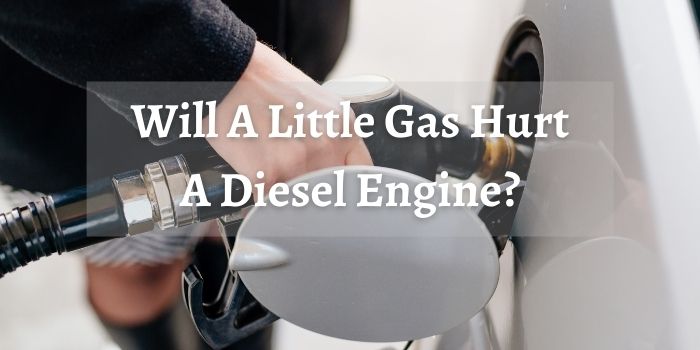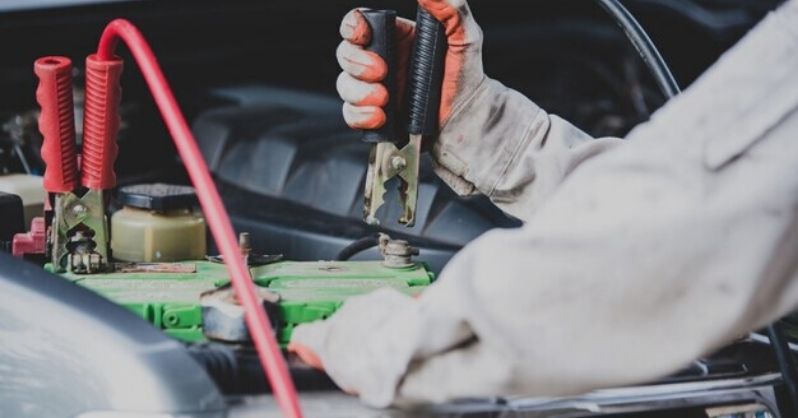If you’ve ever pumped gasoline into a diesel engine, you may have wondered if it would cause any damage. So, will a little gas hurt a diesel engine? According to mechanics, the answer is no – a little gas won’t hurt a diesel engine.
In fact, in some cases, it may even be necessary to add a small amount of gasoline to your tank if you’re running low on fuel. So if you’re ever stuck without any diesel, don’t panic; just fill up with some gasoline and get back on the road.
While it’s true that diesel engines are finicky when it comes to fuel, they’re also not nearly as sensitive as some people might think. As long as you fill up with diesel again as soon as possible, it shouldn’t be a problem!

Will Gas In A Diesel Engine Hurt?
If you put a small amount of gas in a diesel engine, it’s unlikely to cause any serious damage.
The gas will simply be burned off as the engine runs. However, if you put a large amount of gas in the tank, it can cause some serious problems. The gas will not ignite appropriately in the diesel engine, and this can lead to a lack of power and decreased efficiency.
Moreover, running a diesel engine on gasoline can cause deposits to build up on the injectors and pistons, reducing engine performance and eventually leading to engine damage.
Additionally, gas is less combustible than diesel, so it won’t produce as much power when used in a diesel engine. For these reasons, it’s best to stick with using diesel fuel in your diesel engine to avoid any potential problems.
Will Gallon Of Gas Hurt A Diesel Engine?
If you put a little bit of gasoline in your diesel truck, the potential risks are low. Gasoline has a lower flash point than diesel fuel, so it’s possible that the gasoline could ignite in the engine.
However, this is unlikely to cause any serious damage. The main potential issue is that the gasoline could dilute the diesel fuel, lowering its overall quality.
This could potentially lead to engine problems down the road. As such, it’s generally best to avoid using gasoline in a diesel engine.
If you accidentally put a small amount of gasoline in your tank, it’s probably not worth worrying about. However, if you put a large amount of gasoline in your diesel truck, you should have it serviced by a professional as soon as possible.
What Happens If You Mix Gas With Diesel?
Mixing gas with diesel is a common mistake, and it can have serious consequences for your vehicle. Diesel fuel is thicker than gasoline, and it has a higher viscosity.
As a result, it doesn’t flow as easily and can quickly clog up the fuel filter. In addition, the higher compression ratio in diesel engines means that gasoline will ignite prematurely, leading to engine damage.
If you accidentally fill your tank with the wrong fuel, don’t start the engine. Instead, call a tow truck and have your vehicle towed to the nearest service station. Trying to drive with the wrong fuel in the tank will likely cause extensive damage to your engine.
How Much Gas Will Mess Up A Diesel Engine?

The amount of gas that will mess up a diesel engine depends on how much fuel is in the tank. A small amount of gasoline mixed in with diesel fuel will not cause any harm to the engine.
However, if there is a significant amount of gasoline present, it can damage the fuel injectors and other parts of the engine. Gasoline is also more volatile than diesel fuel, so it can easily vaporize and start a fire.
In the U.S., unleaded gasoline typically has an octane rating of 87. Diesel fuel, on the other hand, has an octane rating closer to 150. That’s because diesel engines are compression ignition engines, meaning that they rely on high temperatures to ignite the fuel-air mixture.
Will A Small Amount Of Petrol Damage A Diesel Engine?
The quick answer is yes. It is possible to put a small amount of petrol in a diesel engine and it will still run, but eventually, the petrol will cause damage to the engine. Petrol is highly combustible and the fuel injectors in a diesel engine are designed to spray a fine mist of diesel fuel into the engine cylinders.
This mist is then ignited by the high compression in the cylinders. However, petrol is not as easily ignited as diesel and the petrol droplets will tend to pool together rather than being evenly distributed throughout the cylinder.
As a result, the mixture in the cylinder will be too lean and won’t ignite properly, leading to a loss of power and potential damage to the engine.
So while you may be able to get away with putting a small amount of petrol in a diesel engine, it’s not something that you should do on a regular basis.
Big Differences Between Gasoline And Diesel Fuel
Gasoline and diesel fuel are both made from crude oil, but they are refined differently.
Gasoline is most commonly used in passenger cars and light trucks, while diesel fuel is used in heavier vehicles like buses and tractor-trailers. One key difference between the two fuels is the octane level.
Gasoline typically has a higher octane level than diesel, which means it can withstand higher compression ratios without detonating. As a result, gasoline engines tend to be more efficient than diesel engines. However, diesel fuel also has some advantages.
It contains more energy per gallon than gasoline, so it can provide better fuel economy. Diesel engines also tend to last longer than gasoline engines, due in part to the higher compression ratios.
With proper maintenance, a diesel engine can easily reach 1 million miles of operation. Ultimately, whether gasoline or diesel is the better choice depends on the specific application.
Conclusion
So, if you’re looking for a quick and easy way to ruin your diesel engine, filling it up with gasoline is the way to go! Just kidding – don’t do that. In all seriousness, adding gasoline to a diesel engine can cause serious and expensive damage.
If you think you may have put in too much gas or are worried about how much fuel is left in your tank, take your car to a mechanic as soon as possible for inspection.